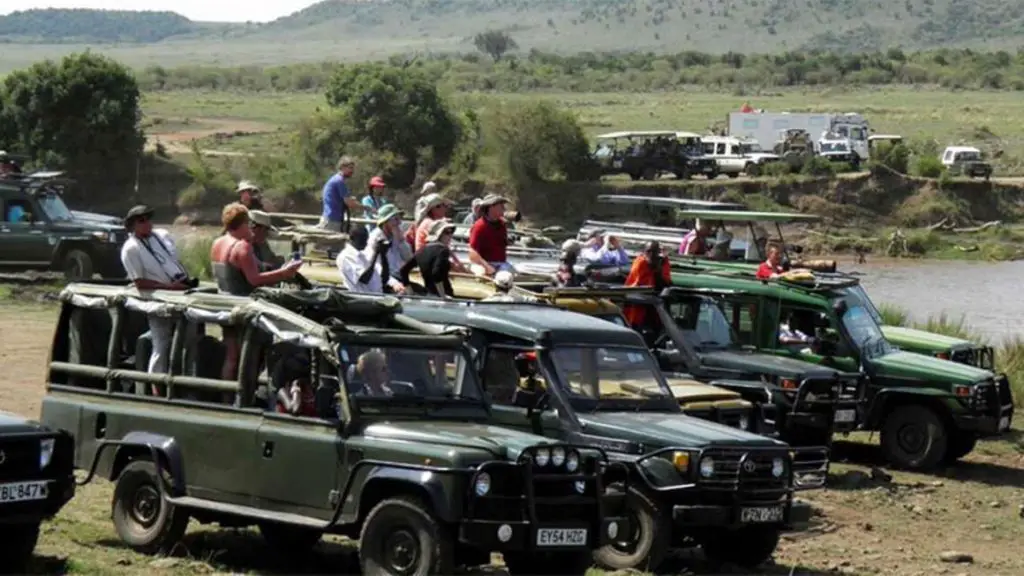- Kenya’s Ministry of Tourism and Wildlife plans to implement a visitor capping measure that will see rates increase by more than six times.
- Measures will involve capping the daily number of visitors allowed in certain national parks and game reserves.
- KWS to use a digital payment system and online ticketing, the number of tourists, both local and non-resident, will be restricted to an acceptable level.
In an effort to reduce high season overcrowding and encourage travel throughout the year, Kenya’s Ministry of Tourism and Wildlife plans to implement a measure that will see rates increased by more than six times.
This measure will involve capping the daily number of visitors allowed in certain national parks and game reserves.
According to a new policy paper published by the ministry, the limit would be set for the carrying capacity of the priority parks.
Because of this, high-traffic parks and reserves, including Masai Mara, Amboseli, and Nairobi National Park, won’t be able to accommodate more people than their current volumes of 32,000, 13,000, and 10,000 per month, respectively.
Online ticketing and Digital payment to implement the policy
Through the use of a digital payment system and online ticketing, which the Kenya Wildlife Service (KWS) intends to implement in all of the country’s national parks and reserves, the number of tourists, both local and non-resident, will be restricted to an acceptable level.
The digital system will generate tickets that contain information about the traveller, such as the validity date of the ticket, as well as a cost breakdown that details all of the prices, including the portions of those fees that are designated for park development and conservation.
According to the Ministry of Tourism and Wildlife, “capping the size of tourists in priority parks could limit the overall number of tourists but shouldn’t severely affect overall earnings if accompanied by a seasonal increase in costs.”
“The primary hypothesis is that costs will rise between June and October for residents and non-residents, including nationals of the African Union, by a factor of two to six times in the Masai Mara and by a factor of thirty to one hundred and fifty per cent in Amboseli and Nairobi Park,” precisely assuming there is no decrease in the number of tourists as a result of the price increases.”
This decision was made in response to growing concerns about the impact that overcrowding of safari vehicles and tourists in game parks and reserves like Masai Mara, particularly during the time of year when the great wildebeest migration occurs, could have on the area’s wildlife as well as its ability to meet international tourism standards and appeal to tourists.
However, in order to meet the increased demand during the busy season, the capping has been adjusted to charge more for access. In addition, guests will be required to pre-book their entry tickets to the park in order to cut down on lines and prevent any instances of fraud at the entrance. The ticket will be nonsaleable and linked to a person’s personal identification number (ID) or passport number to prevent tour operators from reselling tickets.
The plan is an element of a strategy for the tourism industry that will run from now through 2025 and covers the next five years.
It comes at a time when theme parks are pulling back on higher ticket sales fueled by locals tourist during the COVID-19 pandemic period, amid disruption in worldwide travel.
Kenya’s tourism industry anticipates a sustained rebound as well as a significant increase in the number of tourists from other countries. In 2021, the overall number of visitors to national parks and wildlife reserves increased by 40.8%, reaching 1.28 million, up from 913,052 in the previous year.
Additionally, the amount of revenue reached Sh1.48 billion.
Both the number of people who visit the parks and the amount of money it brings in have not yet reached their 2019 levels of 2.27 million and Sh4.37 billion, respectively.
Masai Mara, Amboseli, and Nairobi National Parks visitors to be capped
Even during its peak season from June to October, when hotels, lodges, and tour operators charge their highest rates, the number of visitors to Masai Mara will be capped at no more than 32,000 of its carrying volume thanks to the new measures.
As of 2019, the park exceeded its capacity with 54,000 and 60,000 tourists in the months of July and August, respectively.
The ministry will operate under the assumption that the volumes that will be lost during this period, such as in July and August, will be somewhat redistributed in the shoulder months of June, September, and October.
In the same year (2019), the number of visitors to Amboseli exceeded the capacity of 13,000 on six separate occasions: February, July, August, September, October, and December.
According to the data collected in 2019, Nairobi National Park has been welcoming more people than its 10,000 annual allotments throughout the year.
It is anticipated that expenditure on tourism will return to the levels seen in 2019 by 2024 when a total of US $1.97 billion (Sh229.4 billion) was recorded as spending on leisure travel from the top 40 source markets throughout the world.
Read: Hospitality Group Accor brings its Mantis Brand to Kenya’s Masai Mara
